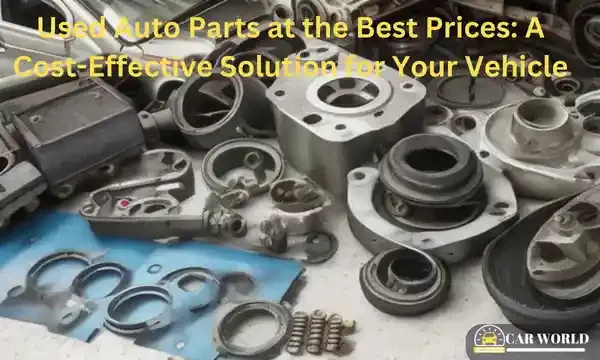Used Auto Parts at the Best Prices: A Cost-Effective Solution for Your Vehicle
If you're a car owner who's looking for ways to save money on repairs and maintenance, opting for used auto parts can be a smart choice.
In today's article, we'll delve into the world of used auto parts, exploring the benefits, considerations, and tips for finding the best deals. So, let's jump right in!
Table of Contents
- The Advantages of Choosing Used Auto Parts
- Factors to Consider Before Purchasing
- Where to Find Reliable Used Auto Parts
- How to Ensure Quality and Compatibility
- DIY Installation vs. Professional Help
- Environmentally-Friendly Aspect of Using Used Parts
- Tips for Negotiating and Making the Purchase
- Conclusion
- Frequently Asked Questions (FAQs)
- Are used auto parts as reliable as new ones?
- How do I know if a used auto part will fit my vehicle?
- Can I return a used auto part if it's defective?
- What's the average price difference between used and new auto parts?
- Are there specific parts that are better to buy new?
When your vehicle needs repair, one of the most significant expenses can be the replacement parts. However, there's an alternative that can save you a substantial amount of money – used auto parts. These parts are salvaged from vehicles that are no longer in use but still have functional components. Let's explore why choosing used parts might be the right decision for you.
The Advantages of Choosing Used Auto Parts
Opting for used auto parts comes with several benefits. First and foremost, it's a cost-effective solution. Used parts are often significantly cheaper than their brand-new counterparts, allowing you to save money without compromising on quality. Additionally, using used parts helps reduce the demand for new manufacturing, which contributes to environmental preservation.
Factors to Consider Before Purchasing
Before purchasing used auto parts, there are a few crucial factors to consider. You need to know the exact part you require and have information about your vehicle's make, model, and year. Understanding the compatibility of the used part with your vehicle is essential to ensure a successful replacement.
Where to Find Reliable Used Auto Parts
There are various sources for acquiring used auto parts. Local salvage yards, online marketplaces, and auto recycling centers are some of the options you can explore. It's important to source from reputable sellers to ensure the quality and functionality of the parts.
How to Ensure Quality and Compatibility
To ensure the quality of used auto parts, it's recommended to inspect them thoroughly before making a purchase. Look for signs of wear and tear, and if possible, request the part's history. Additionally, cross-reference the part's compatibility with your vehicle's specifications.
DIY Installation vs. Professional Help
Deciding whether to install used auto parts yourself or seek professional help depends on your mechanical skills and the complexity of the repair. While some repairs are DIY-friendly, others might require the expertise of a mechanic to ensure proper installation.
Environmentally-Friendly Aspect of Using Used Parts
Using used auto parts contributes to a more sustainable automotive industry. By recycling and reusing components, you help reduce the environmental impact of manufacturing new parts. It's a small but meaningful step toward a greener future.
Tips for Negotiating and Making the Purchase
When purchasing used auto parts, honing your negotiation skills can be advantageous. Inquire about warranties or return policies, and don't hesitate to ask for a better price. Thoroughly understand the terms of the sale before finalizing your purchase.
Conclusion
Choosing used auto parts is a practical and environmentally-conscious way to save money on vehicle repairs. By understanding compatibility, ensuring quality, and exploring reliable sources, you can successfully integrate used parts into your car maintenance strategy.
Frequently Asked Questions (FAQs)
Are used auto parts as reliable as new ones?
- Used auto parts can be just as reliable as new ones, provided they are sourced from reputable sellers and inspected for quality.
How do I know if a used auto part will fit my vehicle?
- You need to know your vehicle's make, model, year, and specific part specifications. Cross-referencing this information with the used part is crucial for compatibility.
Can I return a used auto part if it's defective?
- Policies vary among sellers, so it's essential to understand their return or exchange policy before making a purchase.
What's the average price difference between used and new auto parts?
- Used auto parts are generally significantly cheaper than new parts, often offering savings of 50% or more.
Are there specific parts that are better to buy new?
- Critical components like safety-related parts (brakes, airbags) might be better purchased new for optimal performance and safety.
In conclusion, choosing used auto parts is a practical, cost-effective, and environmentally friendly choice for car owners. By following our guidelines for sourcing, inspecting, and installing these parts, you can keep your vehicle running smoothly without breaking the bank. Remember, a well-maintained car doesn't always require brand-new parts. Access the link above to explore further options for affordable and reliable used auto parts.


.webp)